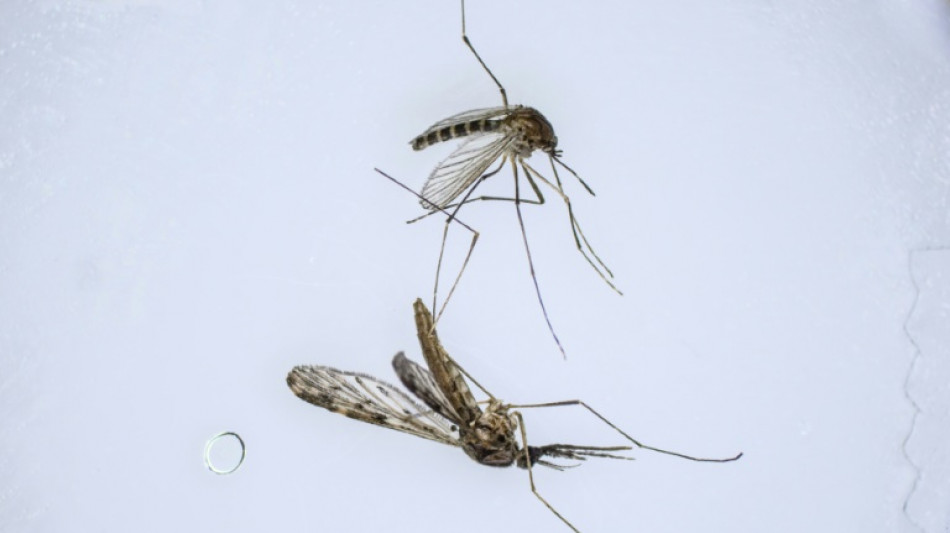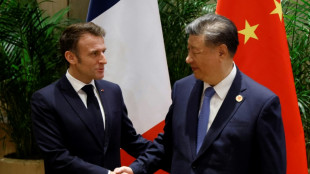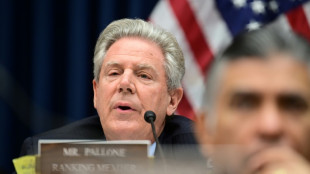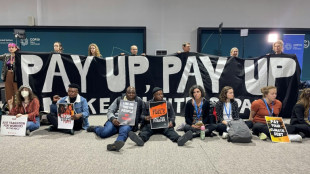
-
 Stocks diverge on fears of Ukraine-Russia escalation
Stocks diverge on fears of Ukraine-Russia escalation
-
New Botswana leader eyes cannabis, sunshine to lift economy

-
 'Operation Night Watch': Rembrandt classic gets makeover
'Operation Night Watch': Rembrandt classic gets makeover
-
Haiti police, civilians kill 28 gang members: authorities

-
 Taxing the richest: what the G20 decided
Taxing the richest: what the G20 decided
-
'Minecraft' to come to life in UK and US under theme park deal

-
 IMF, Ukraine, reach agreement on $1.1 bn loan disbursement
IMF, Ukraine, reach agreement on $1.1 bn loan disbursement
-
Japan on cusp of World Cup as Son scores in Palestine draw

-
 Chelsea condemn 'hateful' homophobic abuse towards Kerr, Mewis
Chelsea condemn 'hateful' homophobic abuse towards Kerr, Mewis
-
Hamilton to race final three grands prix of Mercedes career

-
 Gatland has not become a 'bad coach' says Springboks' Erasmus
Gatland has not become a 'bad coach' says Springboks' Erasmus
-
Slovakia take Britain to doubles decider in BJK Cup semis

-
 Brazil arrests soldiers over alleged 2022 Lula assassination plot
Brazil arrests soldiers over alleged 2022 Lula assassination plot
-
Ukraine war and climate stalemate loom over G20 summit

-
 Ukraine fires first US long-range missiles into Russia
Ukraine fires first US long-range missiles into Russia
-
Retiring Nadal to play singles for Spain against Netherlands in Davis Cup

-
 Rain ruins Sri Lanka's final ODI against New Zealand
Rain ruins Sri Lanka's final ODI against New Zealand
-
Stocks sink on fears of Ukraine-Russia escalation

-
 Hendrikse brothers start for South Africa against Wales
Hendrikse brothers start for South Africa against Wales
-
Macron tells Xi he shares desire for 'durable peace' in Ukraine

-
 Ruthless Japan beat China to move to brink of World Cup qualification
Ruthless Japan beat China to move to brink of World Cup qualification
-
French farmers threaten 'chaos' over proposed EU-Mercosur deal

-
 Brazil arrests G20 guards over alleged 2022 Lula assassination plot
Brazil arrests G20 guards over alleged 2022 Lula assassination plot
-
China's Xi urges 'strategic' ties in talks with Germany's Scholz

-
 Raducanu gives Britain lead on Slovakia in BJK Cup semis
Raducanu gives Britain lead on Slovakia in BJK Cup semis
-
Russia says Ukraine fired first US-long range missiles

-
 COP29 negotiators strive for deal after G20 'marching orders'
COP29 negotiators strive for deal after G20 'marching orders'
-
Walmart lifts full-year forecast after strong Q3

-
 British farmers protest in London over inheritance tax change
British farmers protest in London over inheritance tax change
-
NATO holds large Arctic exercises in Russia's backyard

-
 Trouble brews in India's Manipur state
Trouble brews in India's Manipur state
-
Son of Norwegian princess arrested on suspicion of rape

-
 Romanian court says 'irregularities' in influencer Andrew Tate's indictment
Romanian court says 'irregularities' in influencer Andrew Tate's indictment
-
Iran faces fresh censure over lack of cooperation at UN nuclear meeting

-
 Despondency and defiance as 45 Hong Kong campaigners jailed
Despondency and defiance as 45 Hong Kong campaigners jailed
-
Scholar, lawmakers and journalist among Hong Kongers jailed

-
 European stocks slide on fears of Russia-Ukraine escalation
European stocks slide on fears of Russia-Ukraine escalation
-
Police break up Georgia vote protest as president mounts court challenge

-
 Spain royals visit flood epicentre after chaotic trip
Spain royals visit flood epicentre after chaotic trip
-
France's Gisele Pelicot says 'macho' society must change attitude on rape

-
 G20 leaders talk climate, wars -- and brace for Trump's return
G20 leaders talk climate, wars -- and brace for Trump's return
-
US lawmaker accuses Azerbaijan in near 'assault' at COP29

-
 Tuchel's England have 'tools' to win World Cup, says Carsley
Tuchel's England have 'tools' to win World Cup, says Carsley
-
Federer hails 'historic' Nadal ahead of imminent retirement

-
 Ukraine vows no surrender, Kremlin issues nuke threat on 1,000th day of war
Ukraine vows no surrender, Kremlin issues nuke threat on 1,000th day of war
-
Novo Nordisk's obesity drug Wegovy goes on sale in China

-
 Spain royals to visit flood epicentre after chaotic trip: media
Spain royals to visit flood epicentre after chaotic trip: media
-
French farmers step up protests against EU-Mercosur deal

-
 Rose says Europe Ryder Cup stars play 'for the badge' not money
Rose says Europe Ryder Cup stars play 'for the badge' not money
-
Negotiators seek to break COP29 impasse after G20 'marching orders'

| RBGPF | -0.74% | 59.75 | $ | |
| RYCEF | -2.24% | 6.7 | $ | |
| BCC | -2.22% | 138.47 | $ | |
| CMSC | -0.02% | 24.62 | $ | |
| RIO | 0.17% | 62.227 | $ | |
| VOD | -0.51% | 8.875 | $ | |
| SCS | -1.03% | 13.065 | $ | |
| JRI | 0.15% | 13.25 | $ | |
| RELX | 0.3% | 45.175 | $ | |
| CMSD | 0.12% | 24.42 | $ | |
| NGG | 1.02% | 63.55 | $ | |
| BCE | 0.64% | 27.405 | $ | |
| GSK | -0.9% | 33.39 | $ | |
| BP | -1.26% | 29.055 | $ | |
| AZN | 0.77% | 63.885 | $ | |
| BTI | 0.45% | 36.845 | $ |

As climate warms, S. Korea fights new border threat: malarial mosquitoes
Near the heavily fortified border that divides North and South Korea, a monitoring device is working 24-7 -- not tracking missiles or troop movements, but catching malaria-carrying mosquitoes that may cross the border.
Despite its advanced healthcare service and decades of determined efforts, achieving "malaria-free" status has remained elusive for South Korea, largely thanks to its proximity to the isolated North, where the disease is prevalent.
The South issued a nationwide malaria warning this year, and scientists say climate change, especially warmer springs and heavier rainfall, could bring more mosquito-borne diseases to the peninsula unless the two Koreas, which remain technically at war, cooperate.
The core issue is the DMZ, a four-kilometre-wide no man's land that runs the full length of the 250-kilometre (155-mile) border.
The demilitarized zone is covered in lush forest and wetlands, and largely unvisited by humans since it was created after the 1953 ceasefire that ended Korean War hostilities.
The heavily mined border barrier area has become an ecological refuge for rare species -- an Asiatic black bear was photographed in 2018 -- and scientists say it is also an ideal breeding ground for mosquitoes, including malaria carriers that can fly as far as 12 kilometres.
The DMZ has stagnant water plus "plenty of wild animals that serve as blood sources for mosquitoes to feed on in order to lay their eggs", said Kim Hyun-woo, a staff scientist at Seoul's Korea Disease Control and Prevention Agency.
South Korea once believed it had eradicated malaria, but in 1993 a soldier serving on the DMZ was discovered to have been infected, and the disease has persisted ever since, with cases up nearly 80 percent last year to 747, from 420 in 2022.
"The DMZ is not an area where pest control can be carried out," Kim Dong-gun, an environmental biology professor at Sahmyook University in Seoul, told AFP.
As mosquito populations increase, more malaria carriers are "feeding on soldiers in the border region, leading to a continuous occurrence of malaria cases there", he said.
The South Korean health authorities have installed 76 mosquito-tracking devices nationwide, including in key areas near the DMZ.
- 'Disease republic' -
North of the border, malaria is more widespread, with WHO data indicating nearly 4,500 cases between 2021 and 2022, with the country's extreme poverty and food insecurity likely exacerbating the situation.
"North Korea is a republic of infectious diseases," Choi Jung-hun, a former North Korean doctor who defected in 2011 and now works as a physician in the South, told AFP.
Choi said that even though he lived in the north of the country, he had treated malaria patients, including a North Korean soldier who had been based near the border with the South.
Outdated equipment like old microscopes hampers early and accurate malaria diagnoses, Choi said, while malnutrition and unhygienic water puddles and facilities make residents especially vulnerable to the disease.
The severe flooding that struck the North this summer could make things worse. In Pakistan, catastrophic flooding in 2022 contributed to a fivefold increase in malaria cases year-on-year.
"North Korea continues to rely on outdated communal outdoor toilets. Consequently, when floods occur, fecal water overflows, resulting in the swift spread of (all kinds of) infectious diseases," Choi told AFP.
- 'So painful' -
In the last decade, around 90 percent of South Korea's malaria patients were infected in regions near the DMZ, official figures show -- although rare cases have occurred in other areas.
Shin Seo-a, 36, was diagnosed with malaria in 2022 after being hospitalised with recurring high fevers, but she had not visited a border region that year before getting sick.
"I have no recollection of being bitten by any insects," she told AFP of the period before she became ill.
Doctors initially thought she had a kidney infection and it took around 10 days before she was finally diagnosed with the mosquito-borne disease.
Having malaria felt like "I was being stir-fried on a really hot pan," she told AFP, saying it was so painful that in tears, "I once even begged the nurse to just knock me out."
Malaria on the Korean peninsula is caused by the parasite Plasmodium vivax and is known to be less fatal than tropical malaria caused by Plasmodium falciparum, which affects many African countries.
Even so, after contracting malaria Shin developed Nontuberculous mycobacteria, a lung disease that typically affects individuals with a weakened immune system.
"Malaria is a truly terrifying disease," she told AFP, adding that she hoped more could be done to prevent its spread.
But with the nuclear-armed North declaring Seoul its "principal enemy" this year and cutting off contact, as it rejects repeated offers of overseas aid, cooperation on malaria looks unlikely.
A.Williams--AT


